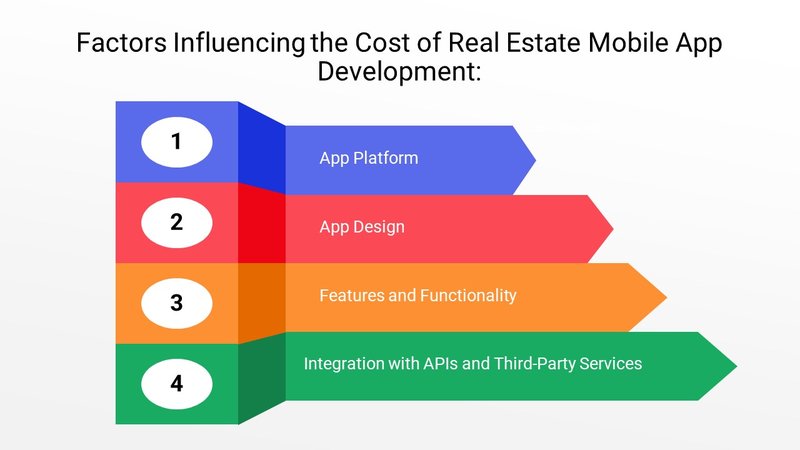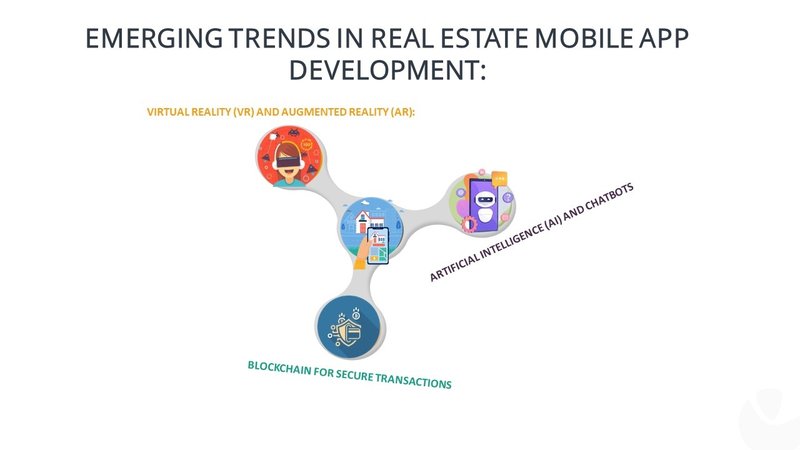Ultimate Guide: Building a Profitable Real Estate App in 2024
Mobile apps have become a crucial tool for many businesses, including real estate, in the quickly expanding digital landscape. A well-designed and feature-rich real estate mobile app may bring enormous value to users by streamlining their property search, connecting them with agents, and allowing them to make informed decisions. Developing such an app, however, necessitates careful consideration of costs and features.
In this blog post, we will look at the world of real estate mobile app development, the elements that influence its cost, and the vital features that can help an app stand out in the extremely competitive real estate market.

Factors Influencing the Cost of Real Estate Mobile App Development:
Several factors influence the overall cost of producing a real estate mobile app. Understanding these aspects can aid organizations in budget planning. Let's have a look at some essential points:

App Platform:
The platform chosen has a substantial impact on the development cost. The two main platforms to consider are iOS and Android. Each platform has its own set of criteria and considerations for development. If you want to reach a larger audience, building for both platforms may be important, but at a higher expense. Alternatively, you can cut development time and costs by using a cross-platform framework such as React Native or Flutter.
App Design:
A visually appealing and intuitive user interface is critical to the success of any mobile app. Wireframes, mockups, and prototypes are created throughout the design phase to establish the app's appearance and feel. Hiring a talented UI/UX designer who understands the real estate market can improve the overall user experience of the app, but it may come at a cost.
Features and Functionality:
The features you choose to include in your real estate mobile app have a big impact on its cost. Property search, property listings, agent profiles, virtual property tours, mortgage calculators, and push notifications are all important elements. Advanced features such as augmented reality (AR) for virtual staging or 3D property visualization can improve the user experience but may necessitate further investment.
Integration with APIs and Third-Party Services:
Integrating with third-party APIs for property listings, geolocation services, and mortgage data can help you give comprehensive real estate information to your visitors. Integrating external services, on the other hand, may necessitate additional labor, customization, and potential licensing fees, influencing the overall cost of development.
Must-Have Features for a Real Estate Mobile App:
In order to design an engaging real estate mobile app that exceeds consumers' expectations, some must-have features must be included. Here are some characteristics that will set your app apart:

Property Search and Filters:
It is critical to have a powerful search tool that allows customers to identify properties based on location, price range, property type, and other pertinent factors. The search results should be presented in an orderly and user-friendly way, allowing for easy comparison.
Property Listings and Details:
Providing extensive property listings with high-quality photographs, detailed descriptions, floor plans, and virtual tours assists consumers in gaining a thorough understanding of the homes they are interested in. Clear and concise information increases potential purchasers' trust and confidence.
Agent Profiles and Contact Information:
Users can connect with reliable and experienced agents by including agent profiles with professional credentials, contact information, and client reviews. This tool promotes transparency and allows buyers and agents to communicate more effectively.
Mortgage Calculator:
By including a mortgage calculator, users may estimate monthly payments depending on the property price, interest rate, and loan length. This function enables prospective buyers to make informed financial decisions and understand the affordability of the properties they want.
Favorites and Saved Searches:
Allowing users to save their favorite properties and create custom search alerts for certain criteria keeps them engaged with the app and gives them a personalized experience. This feature improves user ease and encourages users to return.
Virtual Property Tours:
Virtual property tours, whether through 360-degree pictures, videos, or augmented reality, provide users with an immersive experience. They can view properties remotely using virtual tours, saving time and effort. This function has grown in prominence, particularly in the digital age.
Factors Influencing the User Experience of a Real Estate Mobile App:
Providing an exceptional user experience is critical to the success of any mobile app. Let's look at some critical variables that influence the user experience of a real estate app:

Intuitive Navigation and User-Friendly Interface:
A well-designed software with intuitive navigation ensures that users can easily access and move through different parts. A clean, user-friendly interface improves the whole experience and keeps users interested.
Fast and Reliable Performance:
Users want real estate apps to respond quickly and provide consistent performance. Users can become frustrated and abandon an app if it takes too long to load or crashes frequently. A seamless user experience requires optimizing the app's performance and minimizing loading times.
Personalization and Customization:
Making personalized recommendations based on user's interests and search history can boost app engagement dramatically. Users can customize their experience by using customizable settings and notifications, which fosters a sense of ownership.
Secure and Trustworthy Transactions:
Real estate transactions involve substantial financial commitments, and the security and privacy of user data is critical. Implementing strong security features, such as encrypted transactions and secure authentication, builds user trust and reassures them of the app's dependability.
Emerging Trends in Real Estate Mobile App Development:
The real estate market is evolving as a result of technology improvements. Here are some rising trends in real estate mobile app development to keep an eye on:

Virtual Reality (VR) and Augmented Reality (AR):
Virtual reality and augmented reality technologies are revolutionizing how people interact with real estate apps. Users can take virtual tours of properties and interact with them in a realistic and immersive environment using VR. AR, on the other hand, allows users to superimpose virtual objects on top of real-world views, making virtual staging and interior design visualization possible.
Artificial Intelligence (AI) and Chatbots:
AI-powered chatbots are becoming increasingly popular in real estate apps. These sophisticated virtual assistants may answer client questions, promote properties, and provide personalized support. In addition, AI systems can analyze user behavior and preferences in order to give more relevant content and recommendations.
Blockchain for Secure Transactions:
Blockchain technology improves real estate transaction security and transparency. Blockchain can speed up property transactions, eliminate the need for intermediaries, and assure the legitimacy of property records by utilizing smart contracts. Blockchain implementation can improve trust and streamline the overall buying and selling process.
The Future of Real Estate Mobile Apps:
The future of real estate mobile apps promises intriguing potential as technology advances. Let's have a look at some probable industry developments:
Smart Home Integration:
With the rise of smart homes and Internet of Things (IoT) devices, integrating real estate apps with smart home functionalities can provide customers with increased control and convenience. Consider being able to operate lighting, thermostat, and security systems directly from the app, which would improve the complete home-buying and living experience.

Predictive Analytics:
Using predictive analytics, real estate apps may give users useful insights and forecasts. Apps can forecast property value appreciation, investment potential, and neighborhood expansion by analyzing historical data and market patterns, supporting users in making informed decisions.
Enhanced Virtual Reality Experiences:
Virtual reality experiences are anticipated to become more immersive and realistic in the future. Technological advancements may allow users to examine properties in a virtual environment that closely resembles the physical space. Users could virtually walk through homes, interact with objects, and even feel the texture of materials, offering a totally immersive experience.
Voice-Activated Search and Assistance:
As voice assistants such as Amazon's Alexa and Google Assistant gain popularity, it is likely that voice-activated search and assistance will become more common in real estate apps. Users will be able to use voice commands to search for properties, ask questions, and receive personalized recommendations, making the app more accessible and user-friendly.
Conclusion:

In conclusion, real estate mobile app development offers immense opportunities for businesses to provide value to users and excel in a competitive market. By considering the factors that influence cost, incorporating must-have features, and staying abreast of emerging trends, companies can create exceptional mobile apps that redefine the property search experience.
If you want to develop your next real estate mobile app, let me introduce you to Decodermind. Decodermind provides a wide range of services, from dynamic mobile app development to personalized corporate solutions and cutting-edge web development. Catering to a diverse clientele across various niches and sizes, we have extended our services to clients in the USA, UK, and Europe.
Decodermind is ready to be your trusted partner on this technological journey, whether you are a startup looking for a disruptive app, an established corporation aiming for digital transformation, or a firm in need of bespoke solutions. Our diverse approach, founded on creativity and technical competence, is adapted to the specific needs of your digital ambitions.
We welcome your ideas, questions, and participation. Your ideas inspire our never-ending quest for innovation. Share your thoughts, inquire about our services, or find us on social media. The future of digital innovation in the United Kingdom is not just a story we tell; it is a narrative we co-create. Join us in shaping the next chapter in the technological growth of the United Kingdom. Explore, interact, and embark on a digital transformation journey with Decodermind.

 Hamid Salman
Hamid Salman